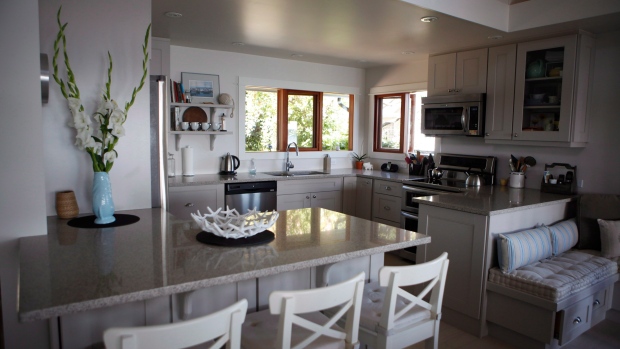
Michelin Guide Awards Its First Hotel Keys in the US
Eleven hotels earned the top three-key distinction, in a list that focused on major markets rather than being truly comprehensive.
Latest Videos
The information you requested is not available at this time, please check back again soon.

Eleven hotels earned the top three-key distinction, in a list that focused on major markets rather than being truly comprehensive.
Blackstone Inc. and KKR & Co. mortgage real estate investment trusts are grappling with deteriorating office loans as higher interest rates and weak demand drive down property values.

Bank of Canada officials said monetary policy easing is expected to be “gradual,” as they debate the timing of a pivot to rate cuts.

Recovering risk appetite and tightening spreads in the commercial real estate market mean active managers have to work a little harder, according to DoubleLine Capital LP.

Iceland’s inflation eased to the slowest pace in more than two years, suggesting its central bank is more likely to begin reducing the western Europe’s highest interest rate in the coming months.
Nov 15, 2018
The Canadian Press

TORONTO -- Real estate markets across the country may be showing signs of softening, but home stager Monique Shaw says her business has been booming.
"People were using staging as a way to sell in a hot market," said the owner of Homes Beautifully by Monique Shaw in Calgary.
"But we're still finding the opposite too. The market isn't as red hot and it's becoming more of a buyers' market now than a sellers' market then, but we're doing a lot more vacant staging. We're just as busy."
Although housing markets may be off the price peaks seen in the spring of 2017, not all related industries stand to lose when property prices head lower. From staging services to renovation companies to drone operators, some industries that support the real estate market expect demand to remain strong.
Shaw says she's seen a recent uptick in business, as homeowners invest more into selling a home because properties can often sit unsold longer on the market. She charges $2100 for the first month for a fully-staged property, and a discounted rate for each following month the house remains on the market.
The latest data from the Canadian Real Estate Association signals that a weakening in markets like Toronto and Vancouver is starting to attribute to lower national home sales.
In October, national home sales fell for the second time in a row while the average price for a sold home came in just under $496,800, down 1.5 per cent compared with a year ago.
Shaw, who is a trained interior designer, says a downturn in the Canadian oil-patch over the past three years has left many landlords scrambling to offload their rentals when tenants lost their jobs.
"When you have an empty property, that's all it appears to be -- empty and a property," she said. "When you stage that home, it becomes a home. It looks like a home. You can imagine yourself in it. You can imagine yourself living in it."
David Foster, who is with the Canadian Home Builders' Association, says a weaker real estate market can also mean more demand for renovations as homeowners forgo a move up due to lack of supply.
"Renovation is seen as the affordable option when someone can't get their dream home either because they can't afford it or it's not available," said Foster, whose group represents 8,600 contractor firms across the country.
"They start thinking, 'What can I do to make this house better? Maybe it's a bathroom reno."'
The CHBA says home renovations was a $77 billion industry in Canada in 2017.
Foster says home improvements are often done within the first two years of purchasing a home, but they also remain a popular option for those who want to wait out a slow market in undersupplied cities like Toronto and Vancouver.
"Affordability is still a huge issue and supply is still a huge issue," he said. "When people see home prices are softening, they're inclined not to sell and instead wait and see what happens next. In the meantime, that might mean improving their current home."
Drone pilot Misha Herschorn doesn't anticipate a quieter real estate market will ground the videography business he started last year.
The majority of business from First Class Drones comes from commercial clients who often want to showcase the size of a property lot, but he's also getting more jobs from real estate agents representing luxury properties.
Herschorn says the commissions realtors receive when selling high-end properties make paying for drone photos and videos worth the cost of doing business -- even in a slowing real estate market.